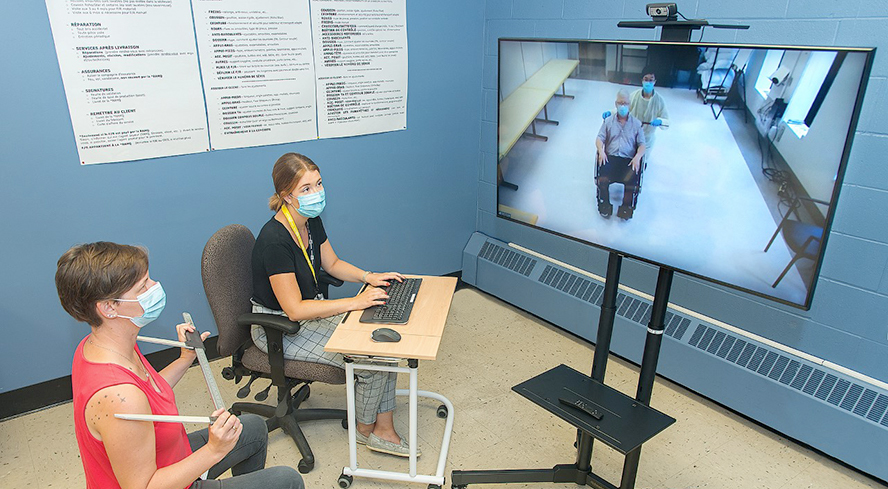The Technical Aids Department (TAD) of the CIUSSS Centre-Ouest-de-l’Île-de-Montréal is mandated to evaluate the needs and provide aids for locomotion and posture. It serves a pediatric, adult and geriatric clientele with musculoskeletal or neurological impairments that limit their movements. TAS interventions are usually delivered at the Lethbridge-Layton-Mackay Rehabilitation Centre or through outpatient clinics delivered to clients at over 100 partner facilities in the health care system: long-term care facilities, seniors’ residences, CLSCs, intermediate resources and hospitals. However, as a result of health measures put in place as soon as the COVID-19 outbreak occurred in March 2020, it was no longer possible for TAS responders to travel to these environments. As a result, users no longer had access to these services and could no longer receive the technical aids necessary for their movements and their positioning and comfort needs.
In order to remedy this situation, the TAD team, in partnership with the Direction de la santé numérique of the CIUSSS du Centre-Ouest-de-l’Île-de-Montréal and the Habilitas Foundation (to obtain computer and audio-visual equipment), has set up a telerehabilitation procedure allowing virtual evaluation clinics. As a result, services were able to resume at the end of April 2020, despite the many challenges involved in implementing this mode of operation. Indeed, given that the technical aids provided at the TAD are made to respond to the specific anthropometric measurements of each user, every effort had to be made to ensure that the measurements taken were as accurate as those taken during in person clinics.
CIUSSS Centre-Ouest-de-l’Île-de-Montréal’s TAD used telerehabilitation during the three waves of the pandemic. This modality continues to be used today to conduct medical clinics and to serve the remote Cree and Inuit clienteles of Northern Quebec. To date, more than 250 virtual assessment clinics have been conducted in some 50 partner institutions and facilities in the health care network, benefiting more than 900 users.
« This unprecedented health crisis has forced us to review our ways of doing things, to innovate and to be creative. » explains Sébastien Thibeault, Clinical Coordinator of the Technical Aids Department, in charge of setting up this project. « The use of telehealth has made it possible to prevent service breakdowns and to provide users with the technical aids they need to carry out their movements and daily activities. »
Telerehabilitation and information technologies are now an integral part of the tools used by the TAD to carry out its clinical activities. Their use will continue beyond the pandemic to ensure optimal organization and accessibility of its services.
The TAD of the Lethbridge-Layton-Mackay Rehabilitation Centre
A wide range of services to the public:
- Personalized needs assessment of manual wheelchairs, rolling bases for positioning and custom-made motorized wheelchairs;
- Evaluation, design and manufacturing of simple and complex positioning devices (seat cushions, custom backrests, headrests, positioning tables, etc.);
- Evaluation of walking aids (canes, walkers, crutches, etc.);
- Evaluation, design and manufacture of orthotics and prosthetics;
- Maintenance and repair service of the granted aids.
A team of over 80 employees:
Occupational therapists, professional technologists, physicians, physiotherapists, positioning mechanics, mechanics, special educators and administrative agents.
